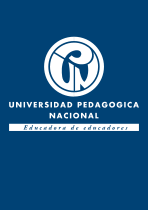Estrategias curriculares de formación en Historia de las Matemáticas en licenciaturas en Matemáticas en Colombia

Citación
Fecha
2019-07-31Autor
Guacaneme, Édgar Alberto
Torres , Ligia Amparo
Arboleda, Luis Carlos
Enlace al recurso
https://revistas.pedagogica.edu.co/index.php/TED/article/view/10540Metadatos
Mostrar el registro completo del ítemResumen
Teniendo en cuenta la necesidad de conocer cómo se está gestionando laHistoria de las Matemáticas (hm) en los programas de formación inicial deprofesores de Matemáticas, en este artículo de investigación se caracterizanlas estrategias curriculares para la formación del conocimiento histórico de lasMatemáticas en nueve licenciaturas colombianas; en este sentido, se buscóresponder cuatro preguntas clásicas: por qué, para qué, qué y cómo se llevaa cabo el estudio de la HM en las licenciaturas. En torno a cada una de estaspreguntas se postularon sendos sistemas conceptuales que fungieron comocategorías de análisis de la información objeto de estudio; esta se acopió através de una estrategia que incluyó el desarrollo de un panel de profesores,el estudio de documentos curriculares de las licenciaturas, y el desarrollo deentrevistas con profesores y estudiantes. Como resultado de la investigaciónse dispone de respuestas que aluden a: el impacto que tiene la existencia deprofesores o grupos de estudio/investigación que asumen la hm en el conocimiento del profesor de Matemáticas como empresa académica, la potencia que se le atribuye al estudio de la HM en relación con la generación de visiones alternativas de las Matemáticas y de sus objetos, las pulsiones que se dan en la elección de una hm que se debate entre su versión general y la HM de objetos matemáticos específicos, o el diverso protagonismo que tiene la HM en los planes de estudio de las licenciaturas.
Editorial
Editorial Universidad Pedagógica Nacional
